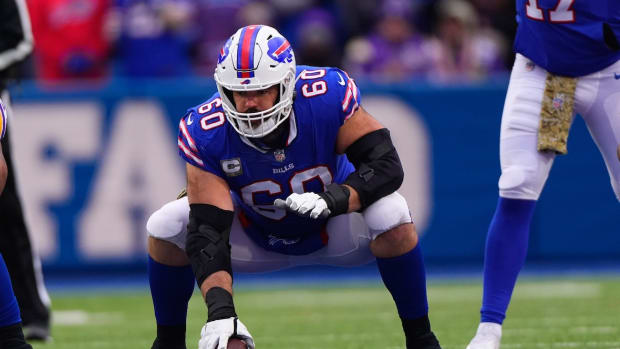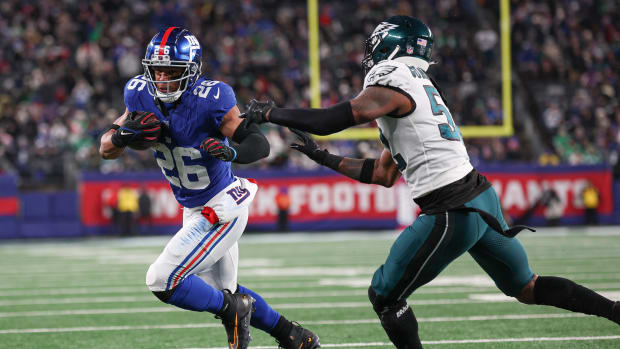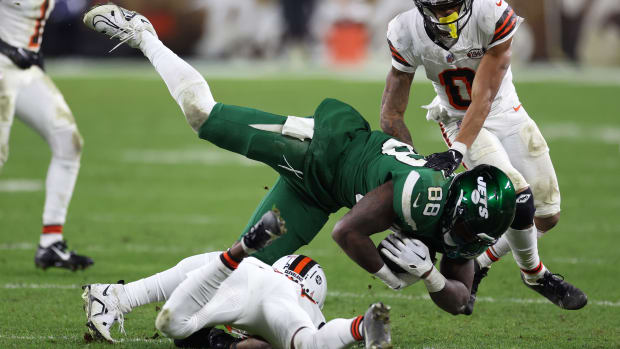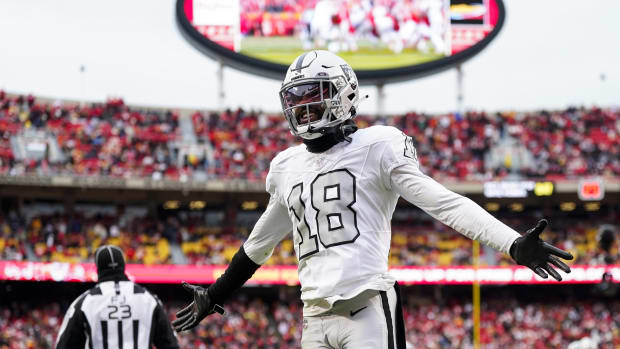The sun is setting in Laguna Beach, Calif., and Trevor Lawrence wants to enjoy it. He opens the blinds so the light can stream in. His fiancé, Marissa Mowry, sits with a glass of red wine. They met as kids and started dating seriously in high school, and soon they will move to . . . well, hang on.
“It’s beautiful out here,” Lawrence says. “Soaking this in is nice. . . . [I’m] just not looking too far ahead. I’m the type of guy if I look too far ahead, I get kind of stressed out.”
He knows what is coming. He has known it for years. On April 29, Lawrence is widely expected to be the NFL’s No. 1 draft pick. As his father, Jeremy, says, “He is leaving the little world of Clemson,” heading to Jacksonville, entering a sports-media industrial complex that will inflate expectations and then chastise him for not meeting them, a warped world that rewards people with warped priorities.
The NFL is a league for the obsessive and the petty, so much so that fans can identify most star quarterbacks by their slights: 199th pick in the draft; passed over by his hometown 49ers; told he should switch to receiver even after he won the Heisman as a quarterback; drafted behind Mitchell Trubisky. This is the league of Bill Parcells’s saying, “This is not a game for the most well-adjusted people”; of Baker Mayfield’s taking offense when his old Browns coach, Hue Jackson, took another job after Jackson was fired; of defensive backs Richard Sherman and Darrelle Revis’s feuding long after Revis retired. And now it is the league of Trevor Lawrence’s saying, “It’s not like I need this for my life to be O.K.
“I want to do it because I want to be the best I can be. I want to maximize my potential. Who wouldn’t want to? You kind of waste it if you don’t.”
Lawrence is only 21. He finished Cartersville (Ga.) High three years ago and still peppers his sentences with like. But he lacks that youthful desire to conquer the world.
“It’s hard to explain that because I want people to know that I’m passionate about what I do and it’s really important to me, but . . . I don’t have this huge chip on my shoulder, that everyone’s out to get me and I’m trying to prove everybody wrong,” he says. “I just don’t have that. I can’t manufacture that. I don’t want to.” Marissa adds, “There’s also more in life than playing football.”
“Yeah,” Trevor says. “And I think people mistake that for being a competitor. . . . I think that’s unhealthy to a certain extent, just always thinking that you’ve got to prove somebody wrong, you’ve got to do more, you’ve got to be better.”
Marissa: “That usually only leads to sadness as well—always, like, striving for something new or better.”
Trevor has always been like this. Everybody in the family says that off the football field, Marissa, who played soccer at Division II Anderson University, is more competitive than he is. His father says, “He’s not award-driven. He’s not, ‘I want to win a Super Bowl at all costs.’ ” Trevor’s coach at Cartersville High, Joey King, says, “There is no doubt about it: With who he is as a person, he could walk away from it tomorrow and be fine.” Others who know Lawrence well agree. This would make for an unusual Nike campaign: Who Needs This, Anyway? It is probably not what a lot of NFL fans want to hear. Lawrence knows his words will get twisted and used against him. He doesn’t seem too worried about it.
Trevor Lawrence is out to prove absolutely nothing. This will either be the reason he makes the Hall of Fame, or the reason he doesn’t.
• Get the May 2021 issue featuring our Trevor Lawrence cover story here.
Lawrence is not just a great quarterback who went 34–2 in three seasons as a starter at Clemson, including a national championship victory over Alabama as a freshman. He is the rare prospect whose talent is beyond debate. Quarterback trainer Jordan Palmer, who first saw Lawrence at the Elite 11 camp when he was a rising high school senior, says, “Every year there is zero, one or two kids who you go, ‘Well, all right, that guy is going to be a star in the NFL.’ ”
Lawrence was one of those, and he has only improved. ESPN’s Mel Kiper Jr. ranks him the fourth-best quarterback prospect since 1979, behind only John Elway, Andrew Luck and Peyton Manning. Last fall NFL fans wondered which team would win the Championship of Suck, finish with the league’s worst record and win the 6' 6", 220-pound Trevor Lawrence Trophy. Lawrence’s future is tantalizing to everybody, it seems, except him.

Mowry and Lawrence, who started dating in junior high school, were married last weekend.
Kohjiro Kinno/Sports Illustrated
Lawrence spent his fall Sundays with Marissa. They would go out to eat, NFL games would be on, people at the next table would say something about his going to the Jets or Jaguars and Lawrence would barely pay attention. He says, “Toward the end [of the season], I was, like, a little curious: I wonder who won this week.” But the question did not consume him.
The Jets offered a chance to play in the country’s biggest media market, but that wouldn’t do much for Lawrence. His celebrity is like a hot-air balloon with his face on it: He sees it hovering above but never climbs in. When Lawrence signed with Clemson, the only media outlet he wanted at the press conference was Cartersville’s Daily Tribune News (circulation: about 6,000). And yet, anybody who assumed he wanted his hometown Falcons to get the top pick was wrong, too. Lawrence is not reclusive, just low-key. He is not driven by a desire to be a global icon.
And then there is the winning element; this is how we judge quarterbacks, and so much of it depends on going to the right franchise. But Lawrence has a different view of that, too. Just as he loves football but doesn’t need it, he loves winning but doesn’t need it. This is a hard thing to prove—in high school and college he rarely lost, and maybe once he tastes defeat more often, it will change him. But he has always gotten over losses quickly. He remained approachable, he talked to his teammates, he did not stew. Lawrence says when his college career ended in January, with a blowout loss to Ohio State in the College Football Playoff semifinals, “I knew I did all I could do. It would be dumb for me in that moment to think I could have done something different.”
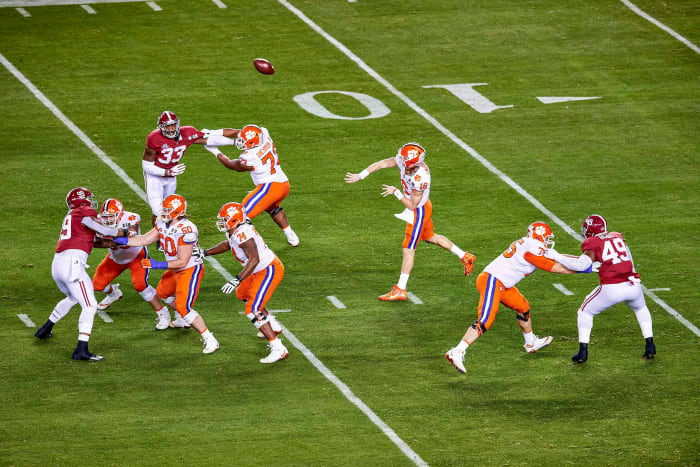
Lawrence delivered a national title to Clemson as a freshman.
Jordan Naholowa'a Murph/Sports Illustrated
Lawrence enters the NFL during an era of player empowerment. Matthew Stafford asked the Lions to move him and got his wish. Russell Wilson and Aaron Rodgers, to varying degrees, have put public pressure on their organizations to fix the roster or find a new quarterback. Meanwhile, Lawrence had only a passing interest in who might control the first few years of his career. All those quarterbacks are trying to take control of their lives rather than cede it to some billionaire. Some are doing it by finding another team; Lawrence is doing it by not letting his team define him.
He knew that whether he lived in Jacksonville or New York, he would be the same person, playing the sport he loves, with the same partner on his arm. He and Marissa were married last weekend.
“That’s such a big thing in anyone’s life, is finding who you want to be with, who you want to marry and who you want to spend the rest of your life with,” he says. “And the fact that we already have that is . . . I mean, it’s just the best.”
This is the kind of perspective you might want for your child. But is it what you want from your franchise quarterback?
This is what the quarterback wants: to play football. Not for the championships, though of course those feel good. Not for the money, though he will enjoy that, too. He just wants to play. It is what he always wanted. He has had a football player’s mentality before he even really knew what football was. He was a wild toddler—“insane,” his father says. His mother, Amanda, says, “Yeah, he was jumping off the walls. . . . I mean, he had stitches in his face like three times before he was three years old. I’m like, Omigosh, they are gonna think we’re abusing him or something?” Trevor wanted to join a team at five but Cartersville made kids wait until they were six. When he finally played, he was so eager to knock people around that his father figured he would become a linebacker. And yet, to really understand Trevor, and why he is the way he is, you have to shift your gaze to the other Lawrence boy: his older brother, Chase.
Chase was the Little Leaguer who would draw pictures in the infield dirt while the pitch was being thrown. He would lie on the bench rather than pay attention. Once, when his team recorded three outs without his assistance, he returned to the wrong dugout, oblivious to the fact that everybody else there was wearing a uniform different from his. The Lawrences finally stopped signing Chase up for sports. His passion was art.
His big brother’s lack of interest in athletics meant that Trevor was never trying to beat Chase—and Chase’s presence served as a tacit reminder that there was life without sports. Trevor says of his own prowess, “There was probably not a huge gap between me and the other players until eighth grade. I was just a good football player. But I just loved it.” Right around the time he started to get recruited, when his ego was at its most inflatable, he also became best friends with Chase, four years his senior.
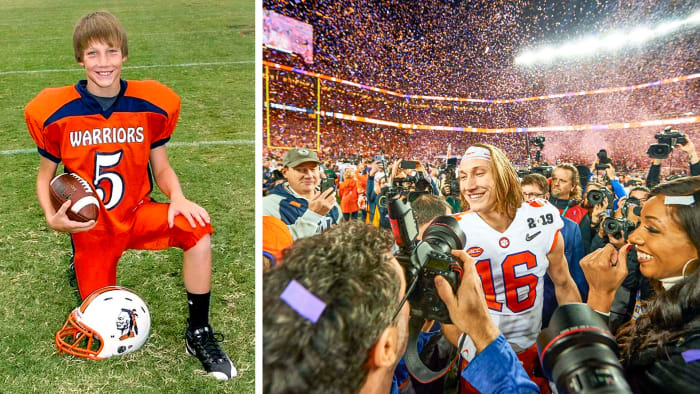
Football has been all smiles for Lawrence so far.
Courtesy of the Lawrence family; Kohjiro Kinno/Sports Illustrated
Chase supports his brother, but even now, he is baffled by people who watch games when they don’t know one of the players personally. He is a questioner by nature. When he was a kid and the Lawrences went to church on Sundays, Chase did not reflexively trust everything he heard. For a while, he trusted none of it. He started questioning other people’s rules, hanging out with artists, experimenting with drugs.
“[My friends and I] loved tripping,” Chase says. “I never had issues with psychedelics. . . . I mean I did a lot of it, but it wasn’t ruining my life.”
He took a lot of Adderall, too. He recognizes the danger now but says, “I don’t really feel like I had any, like, underlying existential issues or anything deep like that. I think I just was curious.” He has since sobered up and devoted himself to Christianity, but he remains a questioner. He and Trevor discuss religion frequently, and both understand that part of being devout means asking why.
“I got to a point to where it really just wasn’t enough for me to like, blindly follow something,” Trevor says. “I have to understand it a little bit. And that’s where we’re at now. We’re just always having good conversations. . . . I’m in my 20s, I’m getting older, kind of transitioning into adulthood, and now it’s like, O.K., ‘What’s really important to me? What do I believe?’ ”
Football is not religion, of course, but there are similarities in Trevor’s approach to both. He is a passionate believer, but on his terms.
When he decided to announce his commitment to Clemson—spurning in-state Georgia—his father warned him, “You realize the moment you post that, you’re going to see more hate than you have in your life.” Trevor shrugged and posted it anyway. There are traces of independent thinking in almost everything he does. Some people have told him bluntly: “I don’t know why you’re getting married,” but he says, “I’m not going to wait three years just to not look weird to other people. I don’t really care.” Last summer Lawrence took two stands that were not necessarily in his self-interest. When COVID-19 threatened to shut down college football Lawrence led the movement to play—even though, as a national champion favored to be the NFL’s top pick, he had the least to gain of anyone. He also publicly supported Black Lives Matter and attended a rally on Clemson’s campus—because, he says, he listened to people who have had a different life experience from his and recognized the value in what they said.
“People give me a lot more credit than I deserve,” Lawrence says. “Obviously, I’m not, like, an activist. I don’t want to be a pawn for anything. I don’t want people to use me for whatever their agenda is. I really want to just care about people.”
The sports world is teeming with people who use religion out of convenience. Lawrence vows never to sign an eight-figure contract and call it “God’s plan.” That is narcissism cloaked in religion. He will also enjoy the sport because he has always enjoyed the sport, not to prove his worth to some TV pundit. Lawrence will be the Christian he wants to be and the football player he wants to be. He will decide what he is getting out of his Sundays.
Pro football will be hard for Lawrence—much harder than the hype indicates. We know it will be hard because in the last 50 years, only three quarterbacks who went No. 1 led their first team to a Super Bowl win and made the Hall of Fame: Elway, Troy Aikman and Peyton Manning. (Eli Manning has done two of the three, but his Hall debate will be robust.) It will also be hard because the game itself is so brutal. The NFL chips away at men. Some become like granite statues—widely admired, permanent parts of the game’s landscape. Others end up in pieces on the floor.
Palmer, who has been working with Lawrence this offseason, says he “has as much NFL franchise quarterback experience going into his rookie year as anybody—and I’d make the argument ever, but [at least] anybody since I’ve been paying attention. Being quarterback for Jacksonville will feel like less than what it’s felt like being the face of college football for three years.”
Lawrence is ready for this to begin. The question is about what follows. What will he do after his next broken bone or his third concussion? Can a man thrive in the NFL if he loves football but doesn’t need it? And if so, for how long?
His father says, “My advice to him, even in high school: ‘God has given you a great gift. But you know, at some point when the game’s taken more from you than it’s giving to you, you need to step away.’ ”
King, the Cartersville coach, says, “Everybody that’s not defined by what they do gets to that point. Think about Andrew Luck, think about Megatron [Calvin Johnson]—that joker could have kept playing. [Trevor] will play as long as God wants him to.”
Palmer says every successful quarterback needs two attributes beyond the physical. One is true confidence, which comes from within. Lawrence has it; even when Clemson was getting blown out by Ohio State, he expected victory. The other is maturity. Well, Lawrence is so mature that, even though he has yet to sign an NFL contract, it is already possible to imagine him retiring.
Lawrence doesn’t mind this conversation, because it blends two things he has no use for: other people’s opinions and a time other than today. He knows he can live without football, he knows he is also wildly excited to play right now, and he knows people might have trouble reconciling the two. He also knows the perils of getting ahead of himself. After a nearly spotless freshman year he struggled in his first game as a sophomore—he decided he was thinking too much about what he was expected to do.
“I just was like, ‘I gotta just be me. And that’s going to be enough.’ ”
King is like a lot of football coaches. He believes in goals. Say them, write them down, wake up every day and try to achieve them. That was the strangest part about coaching the nation’s top high school quarterback: If Trevor Lawrence had goals, he didn’t talk about them. Lawrence never said he wanted to throw for a certain number of yards or so many touchdowns or be named the No. 1 recruit in the country. He would just say, “I just want to be better today than I was yesterday.” And yet, he competed so hard.
Before Lawrence’s senior year King brought the quarterback into his office and tried to pry something out of him. Goals, Trevor. You must have goals. Name one goal. As King recalls, “He wasn’t staring me in the eye or anything. There was probably a hair flip or shoulder shrug when he said it.” Lawrence casually told him, “Coach, I just want to be the best that’s ever done it.” They never spoke of it again.
More SI Daily Covers:
• The Trevor Lawrence Effect and the Jacksonville Effect
• The Year of the Opt-Out Prospect
• What Happened to 'Sports Jeopardy!'?



































